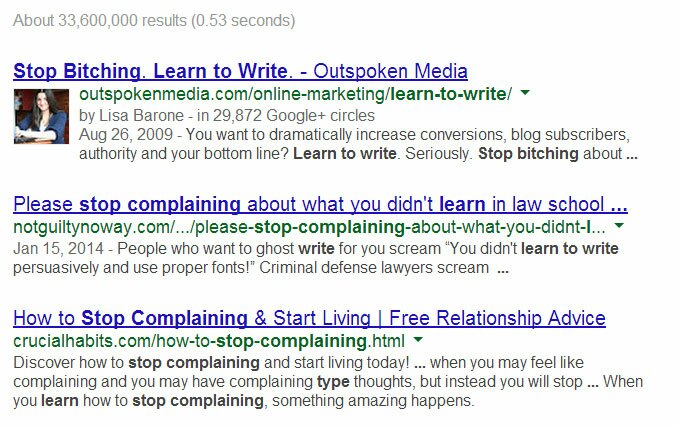Have you wondered what happens to the great content you wrote for a company when you leave?
 I can answer that for you – they leave it up and continue to profit from your hard work while you were an employee there. But, many companies wrestle with the best way to leverage their employees writing while trying to stay in control.
I can answer that for you – they leave it up and continue to profit from your hard work while you were an employee there. But, many companies wrestle with the best way to leverage their employees writing while trying to stay in control.
Brandon Hoe asked a question on Google+ about a friend cross-posting content on both a personal blog and a company blog. That question got me thinking about all the questions around Google’s current authorship push.
Common Questions
Can I assign authorship to my brand?
No. You’re brand is not an author, it’s an entity.
Google wants the ability to pigeonhole individuals across a spectrum of trustworthiness and authority.
Brands already have this via their websites. Trustworthy authors can write for any website and still be trustworthy. People at the other end of the spectrum will be spammy no matter where they write.
This is not new thinking, we’ve just never associated it with Google or machine learning. Google partly determines your authority by who you associate with and where they find your writing. That means every time Brian Clark writes something for a website like Forbes, he gains more authority. Then Google sees that Chris Brogan and Darren Rowse help publicize his Forbes article. They can then see that Brian is also influential in the right circles, so they value him more.
Can I make up a fake person to assign authorship to for my brand?
Yes, but why do that? This seems like a classic lose-lose situation.
You want me to pour out my heart and soul into epic articles for a business that I don’t own so that you can give credit to a fictional character?
What photo are you going to use for your fictional character? How long before someone says, “Brand X is using my photo for their authorship!” Then you can call in the corporate communication crisis team.
I understand this terrifies you. When your brand has a strong voice associated with it, and that person may someday leave, it’s worrisome.
Get over your fear. Almost everyone at your company will be gone in 5 years.
If this is exactly what has you worried, read on.
If an author leaves the company, can I pull her off as the author?
Yes, but it would be short-sighted.
Look at the listing below…

Lisa Barone’s old authorship listing at Outspoken Media
Lisa is at Overit now, but realizes she wrote great stuff while with Outspoken and even back to her early days at Bruce Clay! Her authorship photo is still attached to those articles. That means her reputation is still helping her old employers get found via search because Lisa is a bonafide rockstar in Google’s eyes.
The same is true for your old employees. If they have a good reputation, you will continue to benefit from their authorship long after they have moved on, unless…
What if an old employee removes themselves as being an author on my site
This can happen, but it would be short sighted for the author.
If the old employee wrote good stuff, she will still want it associated with her personal brand. So unless you’ve done something to make her hate you, you shouldn’t have to worry.
So what should a brand do?
Use Google’s authorship as an incentive to get your writers to engage. AUthorship can impact everything from content creation to YouTube videos. Encourage them to start building their network and making themselves for better-known. It’s exactly what the 20th Century mindset taught business owners should not to do. That all the employees are cogs and only the best and brightest should ever get recognition.
Here in the 21st century, the best and brightest still get the recognition, but an employer no longer has the final say in who that will be.
Brands need to stop trying to hoard the limelight. Letting your employees shine is a great way to keep them happier longer.
Excellent article by Phil Buckley. Thank you for your thesis and to answer the questions regarding Authorship/Brands. I have long been researching with a group around Christian Geng (Germany) about the nature of Google Authorship and brands (and their relation). Your article answer me many questions and give me suggestion to think ahead.
Many regards
Elke Greim
Germany
Thanks Elke, I only scraped the surface by addressing the most common questions that seem to crop up over and over again.
Nice article. Thanks for sharing. I’m going to file this away in case any of my clients ever ask about Google authorship and why my picture pops up on some of their posts.
What if a freelance writes for several different niches (as many freelancers do)? Will this hurt their credibility in google’s eyes, when one article is about fitness, another about home decor, and yet others about several other niches? Would being a jack of all trades in google’s eyes hurt their authority? If so, should a freelancer only use their google authorship for relevant niches where they want to build their authority, and simply “ghost write” for other brands in unrelated niches which could bring down their authority level?